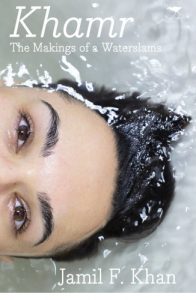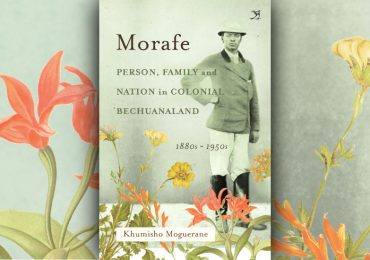The JRB presents an excerpt from Khamr: The Makings of a Waterslams, the forthcoming book by Jamil F Khan.

Khamr: The Makings of a Waterslams
Jamil F Khan
Jacana Media, 2020
Read the excerpt:
~~~
On the night of their return to Johannesburg, I was having pre-club drinks with Neil at Spur when I got a text message from my mother: ‘I’ve been told that you are gay. Is it true? I won’t be angry, just tell me.’
My heart sank. Dominic had taken it upon himself to tell my mother after I had expressly told him I had not done it yet. I was outed before I was ready, but there was nothing I could do. I was surprised but somewhat relieved that I didn’t have to initiate the conversation. Her welcoming tone helped. I knew she would understand. It was my father I was afraid of.
I responded: ‘Yes, Mom, it’s true. We’ll talk when I get home.’
We ended up not going to the club, and I headed home around 1am. I walked into the house quietly, making sure not to disturb anyone. I took my shoes off and sat on my bed for a minute. I was grateful that my mother didn’t reject me and gave me a safe space to confide in her.
But then my bedroom door swung open with the force of the Southeaster. It was my mother with a scowling expression on her face.
‘Where do you come from now?’
‘From Neil, Mommy.’
‘I will never accept this!’ she screamed in a whisper.
‘What do you want from me, Mommy?’
‘I know this is a biological thing, but I will never accept it! Never!’
‘Mommy, just leave please.’
‘And I’m telling your father in the morning.’
My heart shattered. My own mother ensnared me, so that she could humiliate me. I was scared and disappointed. Mostly disappointed in myself for trusting that she would support me. All my life I was afraid that my family would turn on me, and when the time came to truly watch my step, I succumbed to warm, fuzzy feelings of family. Family that was never there in the first place. The weight of what had just happened was unbearable. I changed into my pyjamas, turned off the light and went to sleep hoping I wouldn’t wake up.
When I did, none of the weight of my impending humiliation had dissipated. I sat in my bed trying to work out a plan to sneak out of the house without being noticed. I had to—at all costs—avoid seeing my parents. I sneaked past their bedroom to the bathroom to shower. Everything was in slow motion and on fast forward at the same time. I was a hostage in my own home, trying to plan an escape. I managed to get back to my room unseen, although they could hear me moving around in the house. I had butterflies in the pit of my stomach. I was preparing to be exiled from home. I just knew it was over for me. The previous few months of reckoning helped me come to terms with the possibility of having to live without my parents. I was somewhat prepared to go out on my own. I still had my residence room for the rest of the year, so I would be fine. I had calculated a few possibilities in my head. I was going to be fine, but no amount of preparation could calm the fear that had overcome me. Whatever my fate, I had to get out of that house immediately.
I moved stealthily towards the door, turned the handle slowly and turned it back to its default position, so that it didn’t make a sound. I saw that my parents’ bedroom door was open, and nobody was in the kitchen. That meant they could only be in the lounge. I had to take the chance and hope that they didn’t want to see or speak to me. As I approached the front door, my father’s voice gently apprehended me, ‘Jamil, come here.’
‘Fuck!’ I mumbled under my breath. I couldn’t escape the chiding I was sure was about to follow. I turned back and approached the couch. My father looked as if someone had knocked his breath out of him. He looked tender and hurt. There were no signs of anger or rage anywhere in him. My mother, on the other hand, looked like a dragon ready to incinerate me. She was livid. She showed me—clearly—there was no chance for redemption.
‘Your mother has told me that you’re gay. Is it true? I want to hear it from you.’
‘Yes, it is true.’
‘I need to understand what this means … Do you want to be a woman?’
‘No, Dad. I am a man. I’m happy with being a man, I am just attracted to other men.’
‘Okay, so you’re not going to walk down the road in women’s clothing?’
‘No.’
‘Who is that boy Neil you’re always with? Are you an item?’
‘No, he’s just a friend.’
The questions kept coming. My mother was still huffing and puffing next to him, but we were having a conversation. My father genuinely wanted to understand what my sexuality meant. He needed to understand the difference between a gay man, a drag queen and a transgender person. I had never felt so cared for by my father in my life. I felt like he was protecting me from my mother. He concluded that my sexuality was caused by a physiological hormonal imbalance, and he was sympathetic to it. Both my parents were concerned about what the people would say and how I would conduct myself in public. I stopped the agony.
‘Being gay does not mean I want to be a woman. I’ve always been gay. You’ve always had a gay son. Nothing has changed, except the knowledge that you now have. I have been in agony for the last twenty years. I am now the happiest I have ever been, and for that you should be happy. I understand that this affects you, but with all due respect, it is not about you. Don’t put me at the mercy of the people, because when you lost your job and needed help, the people were nowhere to be found. I am just me.’
My dad nodded. My mother seemed to have calmed down somewhat. I left the house beaming with pride for how I handled myself. I didn’t have to fight. My parents did not disown me. My worst fear had passed me over, and I was still alive. There was nothing that could shake me after that. I could not believe the person who had caused me so much relentless grief became the one to create a safe space for me to come into myself. It remains a difficult thing to reconcile, but I have learnt that one must always leave room for people to become who they are, be it good or bad.
My grandfather’s words ring in my head, in all their simplicity: ‘Jy is nooit te sleg om goed te raakie, en jy is nooit te goed om sleg te raakie.’ He was talking about the acceptance of human beings as infinitely wonderful and infinitely flawed at the same time. I have learnt to live in harmony with contradiction. To this day, my father’s choice to pull me closer and understand a foreign part of me that he had never encountered remains one of the most meaningful events in my life. He loved me with the sensibilities of a rickety old sewing machine: broken, but still trying to stitch something together.
~~~
Khamr: The Makings of a Waterslams is a true story that maps the author’s experience of living with an alcoholic father and the direct conflict of having to perform a Muslim life that taught him that nearly everything he called home was forbidden.
Jamil F Khan says about his debut book: ‘This is not a story for the romanticisation of pain and perseverance, although it tells of overcoming many difficulties. It is a critique of secret violence in faith communities and families, and the hypocrisy that has damaged so many people still looking for a place and way to voice their trauma.
‘This is a critique of the value placed on ritual and culture at the expense of human life and wellbeing, and the far-reaching consequences of systems of oppression dressed up as tradition.’
A detailed account from his childhood to early adulthood, Khan lays bare the experience of living in a so-called middle-class Coloured home in a neighbourhood called Bernadino Heights in Kraaifontein, a suburb to the north of Cape Town.
His memories are overwhelmed by the constant discord that was created by the chaos and dysfunction of his alcoholic home and a co-dependent relationship with his mother, while trying to manage the daily routine of his parents keeping up appearances and him maintaining scholastic excellence.
Khan’s memories are clear and detailed, which in turn is complemented by his scholarly thinking and analysis of those memories. He interrogates the intersections of Islam, Colouredness and the hypocrisy of respectability as well as the effect perceived class status has on these social realities in simple yet incisive language, giving the reader more than just a memoir of pain and suffering.





